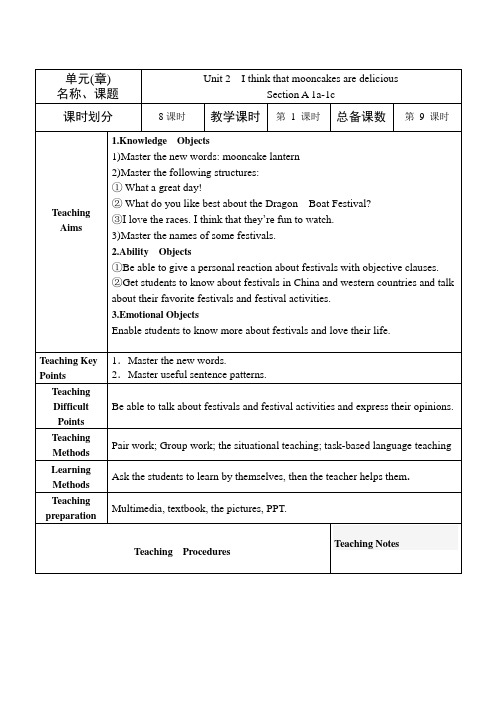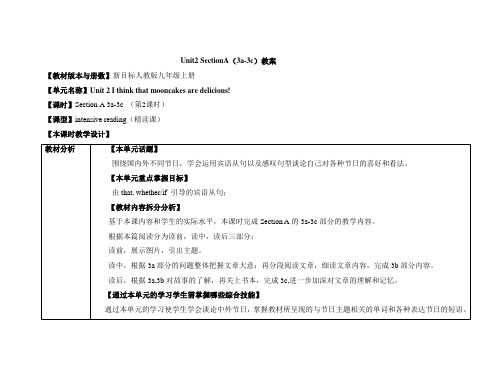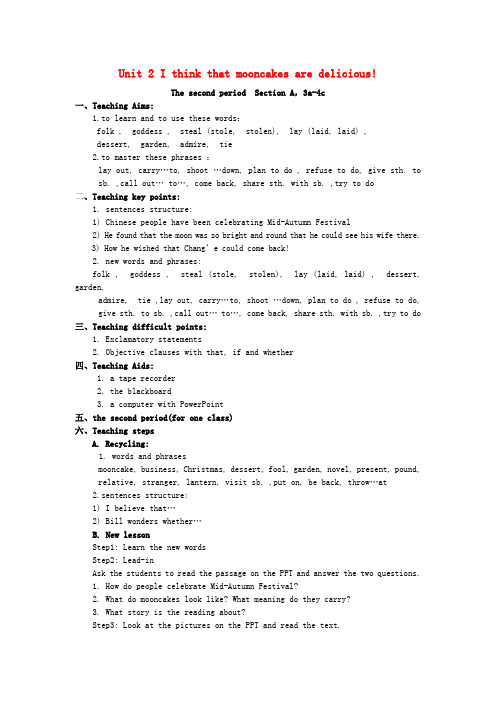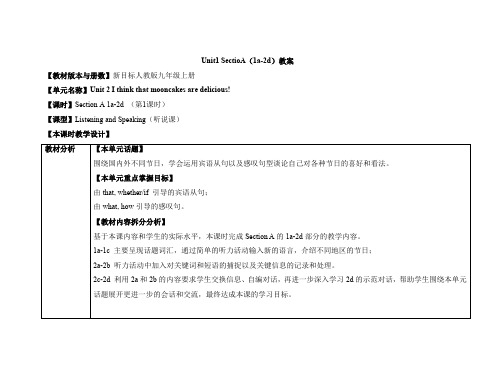人教版(新目标)初中九年级Unit 2 教案
人教新目标九年级英语第二单元教案(教学设计)

①Be able to give a personal reaction about festivals with objective clauses.
②Get students to know about festivals in China and western countries and talk about their favorite festivals and festival activities.
2.Ability Objects
To learn to use objective clauses and exclamatory statements.
3.Emotional Objects
Mid-Autumn Festival carries people’s good wishes to the families .Educate Ss to learn tradition and care for their families.
③Understand the listening material.
3.Emotional Objects
Enable students to know more about festivals and love their life.
Teaching Key Points
1.Master the new words and phrases.
Teaching Methods
Task-based language teaching; Pair work; Group work.
Learning Methods
Listening; Practice; Speaking.
人教版英语9年级全册Unit2_SectionA(3a-3c)教案

Unit2 SectionA(3a-3c)教案【教材版本与册数】新目标人教版九年级上册【单元名称】Unit 2 I think that mooncakes are delicious!【课时】Section A 3a-3c (第2课时)【课型】intensive reading(精读课)【本课时教学设计】附:教学流程设计sharing mooncakes with their families.b.The reading is about the story of Chang’e.3.Let Ss read the passage Para. By Para..Read Para. 1 and answer the questions below.a. What do we eat on Mid-Autumn Festival?b. What’s mooncakes look like?c. Why we eat them on Mid-Autumn Festival? Read Para. 2 and find What they have done. 通过一段一段的阅读,首先在全班朗读的过程中,教师获取反馈,发现学生朗读中的不足以及生疏之处,进行针对性指导,讲解。
同时对文章细节进行理解。
提醒学生抓住关键词,培养学生Skimming 的技巧。
1.学生是否能看懂目标词汇与基本句型。
2.学生是否能用skimming和scanning 解决问题。
3.学生是否能朗读课文于……”,so是副词,其后跟形容词或副词,that 后跟句子。
如:He was so happy that he jumped up.他那么高兴以至于跳了起来。
2) call ou t … to… 对着……大喊……5. He quickly laid out her favourite fruits and desserts in the garden.6. admire v. 欣赏;仰慕He was very successful in his business and all his friends admired him.他的事业非常成功,他的朋友都很羡慕。
九年级英语(Unit 2)教案 人教新目标版 教案

辽宁省丹东七中九年级英语《Unit 2》教案人教新目标版教学目标:1.知识目标:词汇: Key Vocabularyused to, dark be afraid of句型: Target LanguageMario used to be short.Yes, he did. Now he's tall.2. 能力目标:本课学习谈论过去的外表、性格特征和兴趣爱好以及目前的状态。
3. 情感态度Don't judge a person by his appearance.教学重点1.Target language2.The structure: used to教学难点The structure: used to教学准备: tape recorder pictures教学方法:情景操练,反复使用,师生互动,生生互动。
教学过程:Teaching of new lesson1、Ask the students to describle people’s appearane.appearanetall, short, thin, heavy, fat, medium, height, good-looking, straight, hair curly blonde hair, a medium build, glasses, sunglasses, sports shoes2、Ask the students to describe people’s personality.personality outgoing, easygoing, serious, funny, moody, friendly, unfriendly, shy, generous, smart3、Then the teacher shows some photos of himself (herself) taken years ago and says to the students.I used to be short I used to have straight hairI used to wear glasses I was outgoing4、Ask the students to work in pairs with the words above.A: Did you use to be short ?B: Yes, I didA: Did you use to have straight hair ?B: Yes, I didA: Did you use to wear glasses ?B: Yes I didA: Were you outgoing ?B: Yes, I did5、Ask the students to talk to each other with the following sentences pattens.Did you use to be …? Did you use to have … ? Did you use to wear … ?6、Make a dialogue. You haven’t seen your classmates for several years. Now you met in the street and talked to each other with the following words.7、教学2aAsk students: What are they doing? Say: You will hear a boy and a girl talking to each other ata party, some people surely changed a lot. Listen and check the words you hear.8、教学Grammar Focus写一些句子在黑板上:You used to be short. He used to play tennis. Did you use to be short ? Did he use to have long hair ?说明used to用于陈述句而Did…use to 用于一般疑问句。
九年级英语全册 Unit 2 I think that mooncakes are delicious Section A(3a-4c)教案 (新版)人教新目标版

Unit 2 I think that mooncakes are delicious!The second period Section A,3a-4c一、Teaching Aims:1.to learn and to use these words:folk , goddess , steal (stole, stolen), lay (laid, laid) ,dessert, garden, admire, tie2.to master these phrases :lay out, carry…to, shoot …down, plan to do , refuse to do, give sth. to sb. ,call out… to…, come back, share sth. with sb. ,try to do二、Teaching key points:1. sentences structure:1) Chinese people have been celebrating Mid-Autumn Festival2) He found that the moon was so bright and round that he could see his wife there.3) How he wished that Chang’e could come back!2. new words and phrases:folk , goddess , steal (stole, stolen), lay (laid, laid) , dessert, garden,admire, tie ,lay out, carry…to, shoot …down, plan to do , refuse to do, give sth. to sb. ,call out… to…, come back, share sth. with sb. ,try to do三、Teaching difficult points:1. Exclamatory statements2. Objective clauses with that, if and whether四、Teaching Aids:1. a tape recorder2. the blackboard3. a computer with PowerPoint五、the second period(for one class)六、Teaching stepsA. Recycling:1. words and phrasesmooncake, business, Christmas, dessert, fool, garden, novel, present, pound, relative, stranger, lantern, visit sb. ,put on, be back, throw…at2.sentences structure:1) I believe that…2) Bill wonders whether…B. New lessonStep1: Learn the new wordsStep2: Lead-inAsk the students to read the passage on the PPT and answer the two questions.1. How do people celebrate Mid-Autumn Festival?2. What do mooncakes look like? What meaning do they carry?3. What story is the reading about?Step3: Look at the pictures on the PPT and read the text.Step4: learn the key points of the text.Step5: read the text again and put the events in the correct order 3c on page11.__________ Feng Meng tried to steal the medicine.__________ A goddess thanked Hou Yi by giving him a magic medicine.__________ Chang’e refused to give Feng Meng the medicine and drank it all.______1___ How Yi shot down the nine suns and saved the people on the earth.__________ How Yi was very sad and watched the moon at night, and wished hiswife could come back.__________ As a re sult, Chang’e became light and flew up to the sky.__________ How Yi planned to drink the medicine with his wife. 1Step 6: Without looking at the passage, try to complete the sentences with the correctwords.1.People like to a__________ the full moon on Mid-Autumn night.2.The story of Chang’e is one of many t__________ folk stories.3. Hou Yi got a m medicine for shooting down the nine suns.4.Feng Meng wanted to s__________ the medicine.5.How Yi l__________ out fruits and desserts in the garden.Step 7: read the Grammar FocusStep 8: Grammar structures.★Exclamatory statements1. What+a/an + adj. +可数名词单数+ (主语+谓语)!eg:What an interesting city!2. How + adj. + (主语+谓语)!eg: How pretty the girl is!★Objective clauses with that, if and whetherStep 9: write sentences using the words givene.g. think/Lantern Festival/beautifulI think that the Lantern Festival is beautiful.1. don’t know/whether/he/c ome home/for the festival2. believe/Water Festival/most/fun3. wonder/if/mooncakes/delicious4. how/exciting/races5. what/interesting/cityStep 10: Read the passage below and underline the objective clauses. 4b Dear Xia Yu,Do you know that there are two special days for parents in America? One is Mother’s Day on the second Sunday of May and the other is Father’s Day on the third Sunday of June. On these two days, American children often give gift s to their parents or take them out for lunch or dinner. Common gifts are flowers and cards for mothers and shirts or ties for fathers. I heard that it is becoming more and more popular to celebrate Mother’s Day and Father’s Day in China. I wonder if chil dren over there also give similar gift s to their parents. I believe that there are many ways to show our love. Actually, we don’t have to spend a lot of money. It is also a good idea to help parents to do something instead. JuneStep 11: 4c Which festival do you like best? Ask your group and report to the classe.g. In our group, David’s favorite festival is ... He thinks that ...Step 12: summary★Exclamatory statements1. What+a/an + adj. +可数名词单数+ (主语+谓语)!eg:What an interesting city!2. How + adj. + (主语+谓语)!eg: How pretty the girl is!★Objective clauses with that, if and whetherStep 13: Homework1. Preview Section B,2b2.Listen to the tape of section B3. Remember new words and language points, and we are going to have a dictationtomorrow.七、Board DesignUnit 2 I think that mooncakes are delicious!The first period Section A,1a-2d1.new words and phrases:folk goddess steal lay garden admire tie lay out carry…to…shoot …down plan to do refuse to do give sth. to sb. come backc all out… to… share sth. with sb. try to do2. ★Exclamatory statements1. What+a/an + adj. +可数名词单数+ (主语+谓语)!eg:What an interesting city!2. How + adj. + (主语+谓语)!eg: How pretty the girl is!★Objective clauses with that, if and whether。
新目标英语九年级Unit 2全模块教案

新目标英语九年级 Unit 2 全模块教案一、教学目标•了解并掌握本单元的词汇、短语和语法知识。
•能够熟练运用所学知识进行听、说、读、写的综合训练。
•能够理解相关的听力材料,并提高自己的听力技巧。
•培养学生的英语口语表达能力,增强他们的交际能力。
•提高学生的阅读理解能力,并培养他们的阅读习惯。
•培养学生的写作能力,能够用英语进行简单的写作。
二、教学内容1. 词汇与短语•Unit 2 单词:average, customer, delicious, dessert, diary, instead, junk, paste, screen, secret, slice, specialty•Unit 2 短语:a cup of, be made from, be sick, a piece of, at the age of, be tired of, buy…for…, look forward to, talk to, take…seriously2. 语音知识•单词重音:在单词中找出发音音节,判断音节重音所在。
3. 语法知识3.1 名词性从句•引导名词性从句的连接词:that, whether, what, who, whom, whose, which, why, when, where, how等。
•名词性从句作主语、宾语、表语和同位语的句子结构。
•运用名词性从句的句型进行语言表达。
3.2 定义从句•引导限制性定语从句的连接词:that, which, who, whom, whose•并列使用连接词that的定义从句。
•运用定义从句进行描述和补充说明。
3.3 定语从句•引导非限制性定语从句的连接词:that, which, who, whom, whose•根据先行词在定语从句中的不同成分,选择适当的关系代词和关系副词,并完成句子结构。
•运用定语从句对先行词进行修饰。
3.4 名词性从句与定语从句的比较•名词性从句与定语从句的区别和联系。
人教版英语9年级全册Unit2_SectionA(1a-2d)教案

1.学生是否能听懂目标词汇与基本句型。
2.学生是否能用目标词汇回答问题。
3.学生是否能通过听音模仿朗读课文
DELC6
3
深度加工知识
Step 4
Post-
listening(听后)
(5 mins)
Step 5
Pre --listening(听前)
(3mins)
1c Talk about the festival in 1a.
A: I guess the food was delicious, right?
Ss make their own conversations with his or her partner. Then let some pairs act out their conversations.
创编新的对话,巩固拓展学生词汇及语言能力。
The Mid-Autumn Festival
The Chinese Spring Festival
The Water Festival
教授核心句型
Ilike…best, I think that…
教授核心短语
The Lantern Festival
The Mid-Autumn Festival
The Chinese Spring Festival
friends.
3.Wu Ming visited hisrelatives/ friends/
Classmates.
4.Wu Ming liked eating out/ shopping/
The Dragon Boat Festival best.
2.Check the answers wie exercises together.
人教新目标英语九年级 Unit2 SectionA(Grammar focus 4a4c)教案

人教新目标英语九年级 Unit2 SectionA(Grammar focus 4a4c)教案Unit2 SectionA(Grammar focus 4a—4c)教案《英语课程标准》指出:“语言与文化是密切相关的,语言素养包括文化素养。
英语教学应有利于学生理解异国文化,形成跨文化意识、拓展文化视野,同时加深对中华民族优秀传统文化的理解与热爱。
在实际教学中,教师应做到:培养学生跨文化意识。
教师应当结合教学内容,引导学生关注语言和语用的文化因素,了解中外文化的异同,逐步增强学生对英语文化的理解力,为开展跨文化交流做准备。
”背景介绍本节课是围绕节假日展开话题,涉及词汇、句型、语法、功能和文化知识的学习。
教学任务既要增加学生对节日的了解,同时又要使学生在具体语境中理解和体会宾语从句的用法。
教学目标(1)语言技能目标能够使用I know / think / guess / hear / believe / wonder 并结合that、whether和if引导的宾语从句,围绕节日表达自己的观点和看法。
能够运用how和what引导的感叹句来表达较为强烈的感情。
(2)语言知识目标正确使用宾语从句连接词that, whether和if。
能够理解宾语从句的“时态、语序、连接词”三要素。
能够掌握what和how引导的感叹句。
(3)情感态度目标通过使用宾语从句谈论节日,引起学生的兴趣,有助于他们了解自己国家和西方国家的一些节日,培养正确的人生观、价值观以及良好的生活态度。
能够用感叹句来表达情感,对身边的事物作出较为准确的评价。
(4)文化意识目标了解中外节日文化,描绘和推介中国传统文化,实现跨文化交际。
(5)学习策略目标认知策略:让学生在感知体验语言中提升运用语言知识的能力,并且总结语言规律。
调控策略:让学生对节日文化有多元的了解,鼓励他们发表个人看法,主动使用宾语从句和感叹句。
重点难点教学重点:I know / think / guess / hear / believe + (that) + a clause. I wonder + if / whether +6、Complete the exclamatory sentences and then talk about some other pictures using “What ___________________!” and “How ____________________!”(设计意图:因学生表达能力的参差不齐,搭设不同层次的台阶,让尽可能多的学生参与到课堂中来,巩固所学内容即操练和使用感叹句。
人教版新目标英语九年级Unit2单元话题写作教学案

⼈教版新⽬标英语九年级Unit2单元话题写作教学案九年级Unit 2 I think that mooncakes are delicious!写作教学案(教师使⽤)【话题】节⽇(Festivals)【写作⽬标】能运⽤本单元所学的语法(宾语从句和感叹句)及语⾔材料,完成写作介绍⾃⼰熟悉的传统节⽇。
【课前任务】⼀、写出下列短语。
1、出去吃饭2、增加(体重);发胖3、互相4、射落5、叫出6、摆开;布置7、结果 8、提醒;使想起参考答案:1. eat out 2. put on 3. each other 4. shoot down 5.call out/doc/83929bd7fe00bed5b9f3f90f76c66137ef064f46.html y out 7. as a result 8.remind...of⼆、根据汉语意思完成下列句⼦。
1、⼏个世纪以来,中国⼈⼀直都在庆祝中秋节,品尝⽉饼。
Chinese people have been __________ the Mid-Autumn Festival and __________ mooncakes for centuries.2、关于这个节⽇有很多传统的民间故事。
There __________ many __________ _________ __________ about this festival.3、从那以后,⼈们开始了和家⼈⼀起赏⽉和品尝⽉饼的传统。
After this, people started the tradition of __________ the moon and __________ mooncakes with their families.4、送给母亲的常见礼物是鲜花和卡⽚,送给⽗亲的是衬衫和领带。
_________ __________ are flowers and cards_________ mother and shirts __________ ties for fathers.5、我听说在中国庆祝母亲节和⽗亲节变得越来越来流⾏了。
- 1、下载文档前请自行甄别文档内容的完整性,平台不提供额外的编辑、内容补充、找答案等附加服务。
- 2、"仅部分预览"的文档,不可在线预览部分如存在完整性等问题,可反馈申请退款(可完整预览的文档不适用该条件!)。
- 3、如文档侵犯您的权益,请联系客服反馈,我们会尽快为您处理(人工客服工作时间:9:00-18:30)。
人教版(新目标)初中九上Unit 2 I used to be afraid of the dark同步教案II. Teaching materials analyzing and rearranging 教材分析和重组本单元以I used to be afraid of the dark 为话题,共设计了四个部分的内容。
1.教材分析Section A该部分有4个内容模块:第一块围绕What did he use to look like?为话题展开思维(1a)、听力(1b)口语(1c)训练;第二模块围绕What did you use to do? 为话题进行听力(2a-2b)、口语训练(2c);第三模块在以上两模块的基础上以Did you use to be afraid of the dark 为话题展开训练,训练形式为填写表格(3b);第四模块拓展思维,让学生随意谈论自己的过去与现在,并简单陈述一下发生变化的原因。
Section B该部分仍为4个模块;第一模块是思维(1a)与口语(1b)训练;第二模块就used to do 句式进行听力(2a-2b)与口语(2c)训练;第三个模块What did you use to do 这一话题进行阅读(3a)与写作(3b-3c)训练;第四模块让学生进行调查活动(4a-4b),从而提高他们的口语表达能力。
Self Check该部分分为2个模块;第一个模块以填空形式对新词汇进行训练;第二模块要求学生跟句图画中所提供的信息展开写作训练。
Reading该部分设置了5项任务;第一项任务以对话形式启发学生介绍自己的过去与现在,为下一任务作铺垫;第二项任务让学生快速阅读,了解文章大意;第三项任务以填空形式让学生了解文章段与段,句与句之间的关系;第四项任务要求学生了解文章的细节;第五项任务要求学生用新学知识展开活动,具备真正运用语言的能力。
2.教材重组Period 1 New function presentingPeriod 2 PracticePeriod 3 Integrative skillsPeriod 4 ReadingⅢ. Teaching procedures and ways 教学过程与方式Period 1 New function presentingTeaching goals 教学目标Language goals语言目标1. Words &expressions.used to,be interested in2. Key sentencesMario, you used to be short, didn’t you? Yes I did (P10)Did you use to play the piano? No, I didn’t.(P11)Ability goals 能力目标Enable the students to talk about appearances and personalities.Emotion &attitude goals 情感和态度目标Enable the students to deal with changes correctly.Strategy goals 策略目标Enable the students to describe appearances and personalities by comparing.Culture awareness goals文化意识目标People have different behaviors during different ages in different countries.Teaching important points教学重点The structure “used to”and its negative and interrogative forms.Step I RevisionAsk the students to talk about the ways they have used in English learning before.T: Since English learning is such a popular topic among middle school students, nearly every one of us are thinking about one question: how can we improve our English quickly. As a teacher, I think the first thing to do is to improve our ways of learning English. What ways of learning did you use before? Did the ways you used before help you a lot?S1: I think my ways of learning English has helped me a lot. And my English is always the best. The most important thing in learning English is, I think, to practice what we have learned every day, to read aloud, to write more often…S2: I’m not good at English. There must be something wrong with my way of studying English. It doesn’t work at all even if I work harder. I read and write the new vocabulary many times every evening and only to find that I can’t remem ber them all. What should I do now?If such problems arise, offer some suggestions and discuss with the students.T: In my point of view, it is not very useful to remember some new words by merely read and write them time and again. The best way to learn new vocabulary is to practice them in the sentences. Just compare your way of learning English with that of the first student. You can find that he/she never remember words by writing or reading words only. After we learned Unit 1, I believe most of us have changed some of your bad ways in English learning. This is very important. Everything changes except change itself. We are making progress in English learning. So come on. You are the best. Learn from your past and make more change!Step II Lead-inT: As time goes on, we are changing every day. For example, we are growing taller and our hair longer and longer day by day. Our appearances, personalities, etc. change with the growing years. Now think about your changes in the past years. Here’s a very us eful expression to help you express yourself.Show the following expression to the students.used to be + adj: 过去常常是(现在已非如此)used to + v: 过去常常做(现在已非如此)T: It’s very easy to put the expression in use. Look at the following examples.Show the following examples and ask the students to read it repeatedly.She used to be short.He used to be naughty.Tom used to be better.I used to write diary myself when I was his age.We used to swim every day when we were children.We used to grow beautiful roses.I get on well with him. Better than I used to.She didn’t used to do it, did she?You usedn’t to make that mista ke.Used you to make that stories u p out your own head?Used you to play basketball?It used not be so hot in summer in former years.You used to live in London, usedn’t you?There used to be some trees in this field, usedn’t there?Step III Listening (1b: Page 10)Ask the students to read the instructions and sentences in 1b first, then listen to the recording between Bob and his friends.T: How time flies! Bob and his friends haven’t seen each other for four years. Now they see each other again on a sunny day. Look at the picture on Page 10. What changes can we find about his friends?S1: They all grow taller than before. They all used to be shorter.S2: Tina’s hair is longer now. But she used to have short hair.S3: Amy used to be short and she used to wear curly hair. But she is tall and has straight hair now!T: Good guesses! Now listen to the dialogue between them. They all changed a lot. Will Bob feel surprised?Play the recording for the first time.T: For the first time, listen and find out how does Bob feel about his friends’ changes?Check and discuss the answers with the students, reminding the students of the intonation of Bob in the recording. Then ask the students to listen for the second time.T: For the second listening, please pay attention to the changes of his friends. You may write down the key words you hear.Play the recording for the second time. Then ask them to fill in the blanks and check the answers with them.Step IV Listing (1a: Page 10)Ask the students t o list the words to describe people’s appearances and personalities.T: From the above picture and recording, we found that many changes have take place in Bob’s friends. Now work in groups and try to list the words to describe people’s appearances and personalities.Sample lists:light-brown hair, curly hair, black hair, brown hair, brown eyes, blue eyes, pale, attractive, fat, thin, cool, slim, healthy, strong, good-looking, handsome, pretty, beautiful, sick, longAsk the students to fill in the chart. Then check the answers.Step V Listening (2a, 2b & 2c: Page 11)Ask the students to do the listening work.T: Next you will hear some other words used to describe people’s appearances and personalities. Listen and check the words you hear.Play the recording. Then check the answers.T: Listen again and fill in the blanks in the dialogue with the words you hear.Play the recording again, then check the answers. Then ask the students to practice the dialogue. Sample dialogue:S1: Hi, there. Don’t you r emember me?S2: Oh, sorry. I can’t remember now.S1: I’m Jessie. We were in the same class when we studied in Nanshan Primary School.S2: Oh, I got it. Jessie, you used to really short, didn’t you?S1: Yeah. I wasn’t very tall.S2: No, you weren’t. but y ou were always happy. Wait a minute! Did you used to play basketball after school?S1: Yes, I did. But now I’m more interested in playing volleyball. I play volleyball and I’m on the volleyball team.S2: Wow! People sure change.Step VI HomeworkT: In this period, we mainly learned “used to” questions and “used to” statements.Show the following to the students. Ask them to read the example sentences.used to→ Did…+ use to do” →didn’te.g. 1. He used to be quiet.2. They used to play soccer.3. -Did you use to play computer games?-Yes, I did.4. - Did she use to have short hair?-No, she didn’t.Then ask them to write a short passage about the change of themselves. And pre-read 3a on Page 12.。
